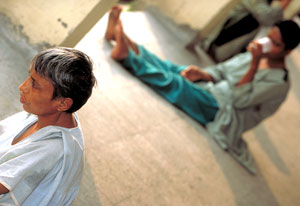Fogarty awards five new chronic disease training grants
June 20, 2014

Photo by Photo by WHO/P. Virot
Recently awarded Fogarty noncommunicable diseases
grants will provide training for researchers working in
mental health.
Noncommunicable diseases such as cancer, diabetes, cardiovascular disease, neurological disorders and mental illness continue to rapidly increase in developing countries, where clinicians and researchers who are properly trained to deal with these conditions are often in short supply. To help address this deficit, Fogarty recently awarded $5.8 million to five institutions to support crucial new research training in low-and middle-income countries (LMICs). Five-year grants from the Chronic, Noncommunicable Diseases and Disorders Across the Lifespan: Fogarty International Research Training Award program (NCD LIFESPAN) will enable LMIC institutions to build expertise, create curriculum in research areas related to noncommunicable health problems, and ultimately produce locally relevant, evidence-based interventions.
"Chronic diseases continue to rapidly increase in low- and middle-income countries, affecting the quality of life of their populations and weakening their economies," said Fogarty Director Dr. Roger I. Glass. "These new awards will help build the ranks of trained, locally-based experts who can tackle these complex conditions."
The new awards will support a diverse array of projects. Mental health implementation training for Mozambican scientists will be the focus of a South-South, lusophone collaborative initiative being launched by New York State Psychiatric Institute, in partnership with Eduardo Mondlane University in Mozambique and the Federal University of São Paulo in Brazil. The ultimate goal is to establish Mozambique as a model for mental health training for other Portuguese-speaking African countries and other low-resource regions.
The University of Michigan will use its funding to improve nursing education programs in Thailand, with a primary focus on cardiopulmonary and cardiovascular diseases, cancer, long-term care and pain management. The other new programs being funded will cover mental health issues, including schizophrenia, mental illness and physical co-morbidities in migrants, and developmental disorders.
Chronic diseases are steadily increasing across the globe, and will soon account for more than 50 percent of health care expenditures and more than 60 percent of the disability-adjusted life years. Fogarty's NCD LIFESPAN program is designed to provide a foundation for the development and implementation of evidence-based interventions, relevant to noncommunicable diseases across the lifespan in LMICs. In some cases, sufficient evidence exists for interventions and implementation strategies, while in other cases, the evidence base may not be well-developed or relevant to the given country or culture. To address this gap, training across the spectrum of research disciplines is encouraged, from basic biomedical, behavioral and social sciences to clinical and applied sciences, including translational and implementation science emphasizing the resources, context and needs of multiple stakeholders in local settings.
Fogarty's NIH funding partners for the awards include the National Institute of Nursing Research (NINR) and the National Institute of Mental Health (NIMH).
2014 awards for Chronic, Noncommunicable Diseases and Disorders Across the Lifespan
More Information
To view Adobe PDF files,
download current, free accessible plug-ins from Adobe's website.